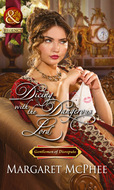Kitap dosya olarak indirilemez ancak uygulamamız üzerinden veya online olarak web sitemizden okunabilir.
Kitabı oku: «The Beckoning Dream», sayfa 2
To which Catherine made no answer, for she could not say, Be damned to King Charles II, I do but agree to save Rob’s neck. Tom Trenchard saw her mutinous expression and read it correctly.
“What, silent, mistress?” he drawled. “No grand pronouncements of your devotion to your King?”
“Quiet—but for the moment. And I have nothing to say to you. Tell me, Sir Thomas, in what capacity will I accompany Master Trenchard here?”
“Why, as his wife, who fortunately speaks Dutch—and French. You are an actress, mistress. Playing the wife should present you with no difficulties.”
“Playing the husband will offer me none,” interjected Tom meaningfully.
“And that is what I fear,” returned Catherine robustly. “I will not play the whore in order to play the wife. You understand me, sir, I am sure.”
“I concede that you have a ready tongue and have made a witty answer,” drawled Tom. “And I can only reply alas, yes, I understand you! Which may not be witty, but has the merit of being truthful.”
“Come now,” ordered Sir Thomas, “you are to be comrades, as well as loving husband and wife. Moreover, once in the Low Countries you are both to be noisily agreed in supporting the Republicans who wish to replace the King with a Cromwellian successor. Master Trenchard will claim to be a member of that family which followed the late Oliver so faithfully.
“And you, being half-Dutch, will acknowledge the Grand Pensionary, John De Witt, to be your man, not King Charles’s nephew, the powerless Stadtholder.” He paused.
“As a dutiful wife,” remarked Catherine demurely, “I shall be only too happy to echo the opinions of my husband.”
Tom Trenchard’s chuckle was a rich one. “Well said, mistress. I shall remind of you that—frequently.”
Sir Thomas smiled benevolently on the pair of them. “I shall inform you both of the details of your journey. You will travel by packet boat to Ostend and from thence to Antwerp in Flanders where you may hope to find Grahame—if he has not already made for Amsterdam, where I gather he has a reliable informer.
“You will, of course, follow him to Amsterdam, if necessary. You will send your despatches—in code—to my agent here, James Halsall, the King’s Cupbearer. He will pass them on to me.
“You will pose as merchants buying goods who are sympathetic towards those unregenerate Republicans who still hold fast against our gracious King. To bend William Grahame to our will is your main aim—because like all such creatures he plays a double game. Why, last year he sold all the Stadtholder’s agents in England to us, and now word hath it that the Stadtholder hath rewarded him with a pension—doubtless for selling our agents to him.
“Natheless, he is too valuable for us to carp at his dubious morals, and if gold and a pardon for his past sins brings him home to us with all his information—then so be it, whether there be blood on his hands, or no.”
Sir Thomas was, for once, Catherine guessed, dropping his pretence of being a benevolent uncle, and doing so deliberately in order to impress on her the serious nature of her mission. She heard Tom Trenchard clapping his hands and laughing at Sir Thomas’s unwonted cynicism.
She turned to stare at him. He was now slouched down in his chair, his feral eyes alight, one large hand slapping his coarse brown breeches above his spotless boots. The thought of spending much time in the Netherlands alone with him was enough to eat away at her normal self-control.
“It seems that only a trifle is needed to amuse you, Master Trenchard. I hope that you take heed of what I told you. I go to Holland as your supposed wife, not as your true whore. Remember that!”
“So long as you do, mistress, so long as you do.”
The insolent swine was leering at her. He might not, by his dress, be one of King Charles’s courtiers, but he certainly shared their morals. It did not help that Sir Thomas’s smile remained pasted to his face as he informed her that she was to pack her bag immediately, and be ready to leave as soon as Tom Trenchard called on her.
“Which will not be until after your last performance tonight. And then you will do as Tom bids you—so far as this mission is concerned, that is.”
Catherine ignored the possible double entendre in Sir Thomas’s last statement. Instead, looking steadily at him, she made one last statement of her own.
“I may depend upon thee, Sir Thomas, that should I succeed, then my brother’s safety is assured.”
“My word upon it, mistress. And I have never broke it yet.”
“Bent it a little, perhaps,” added Tom Trenchard, disobligingly, viciously dotting Sir Thomas’s i’s for him, as appeared to be his habit.
Catherine, after giving him one scathing look, ignored him. She thought again that he was quite the most ill-favoured man she had ever seen, with his high forehead, strong nose, grim mouth and determined jaw. Only the piercing blue of his eyes redeemed him.
She addressed Sir Thomas. “I may leave, now? After the commotion your tipstaffs made, my neighbours doubtless think that I, like my brother, am lodged in the Tower. I should be happy to disoblige them.”
“Indeed, mistress. I shall give orders that your brother be treated tenderly during his stay in the Tower, my word on it.”
And that, thought Catherine, is as much, if not more, than I might have hoped. She gave Sir Thomas a giant curtsy as he waved her away. “Tell one of the footmen who guard the door to see thee home again, mistress,” being his final words to her.
She had gone. Tom Trenchard rose to his feet, and drawled familiarly at Sir Thomas, “Exactly as I prophesied after I toyed with her at the play. The doxy has a ready wit and a brave spirit. I hope to enjoy both.”
He laughed again when the wall hanging behind Sir Thomas shivered as Black Wig, otherwise Hal Bennet, m’lord Arlington, emerged from his hiding place where he had overheard every word of Catherine’s interrogation.
“The wench will do, will she not?” said m’lord. “She may have been the fish at the end of your line, Thomas, but you had to play her carefully lest she landed back in the river again. I observe that you did not directly inform her that she is to use her female arts on Grahame to persuade him to turn coat yet once more—he being a noted womaniser. That may be done by Master Trenchard in Flanders or Holland—wheresoever you may find him!”
He swung on Tom Trenchard, otherwise Sir Stair Cameron, who was now pouring himself a goblet of wine from a jug on a side-table. “She knew thee not, Stair, I trust?”
“What, in this Alsatian get-up?” mocked Stair, referring to the London district where the City’s criminals congregated. “I doubt me whether she could have recognised the King himself if he were dressed in these woundy hand-me-downs.”
“Well suited for your errand in the Netherlands, Stair. None there would take you for the King’s friend, rather the King’s prisoner.”
“Or the friend of m’lord Arlington who turned the Seigneur de Buat away from the Grand Pensionary and towards the Peace party—which cost Buat his head,” riposted Stair.
Arlington’s reply to his friend was a dry one. “His fault, Stair. He was careless, and handed the Pensionary a letter from me, not meant for the Pensionary’s eyes. Do you take care, man. No careless heroics—nor careful ones, either.”
Stair Cameron bowed low, sweeping the floor with his plumed hat that had been sitting by his feet.
“An old soldier heeds thee, m’lord. My only worry is the lady. She may, once she knows what her part in this is, take against Grahame and refuse to enchant him. Furthermore, playing the heroine at the Duke of York’s Theatre is no great matter, and coolness shown on the boards might not mean coolness on life’s stage when one’s head might be loose on one’s shoulders. We shall see.”
Arlington dropped his jocular mode and flung an arm around his friend’s shoulders. “If aught goes amiss, Stair, and the heavens begin to fall on thee, then abandon all, and come home. Abandon Grahame to the Netherlanders if you have cause to suspect his honesty. Let the wolves have the wolf—we owe him nothing.”
“And the lady?”
Arlington looked at Sir Thomas Gower, who shrugged his shoulders. “Deal with her as common sense suggests. She is there not only to seduce Grahame, but to help you with your supposed insufficient Dutch and to give an air of truth to your claim to be a one-time solder turned merchant. You will both claim to have Republican leanings and in consequence are happy to spend some time in God’s own Republic—which is the way in which the Netherlanders speak of Holland.”
Stair toasted Arlington with an upraised goblet. “Well said, friend, and I swear to you that I shall try to persuade the Hollanders that I am God’s own soldier—however unlikely that is in truth.”
Arlington ended the session with a clap of laughter. “The age of miracles is back on earth, Stair, if thou and God may be mentioned in the same breath. Forget that—and come home safely with Grahame and the lady in thy pocket. Great shall be thy reward—on earth, if not in heaven.”
Stair Cameron bowed low again. “Oh, I beg leave to doubt that, Hal. From what I know of our revered King Charles and his empty Treasury, I shall have to wait for heaven. What I do I do for you, and our friendship. Let that be enough.”
Sir Thomas Gower, who had poured a drink for himself and Arlington, had the final word. “Long live friendship, then. A toast to that, and to the King’s Majesty.”
Chapter Two
Catherine Wood, posing as Mistress Tom Trenchard, hung over the packet boat’s side, vomiting her heart up. A spring crossing from London to Ostend was frequently unpleasant, and this one was no exception.
Nothing seemed to have gone right since the afternoon on which Tom Trenchard had called at her door to escort her to the docks. His appearance was as fly-by-night as it had been forty-eight hours before in Sir Thomas Gower’s office. Behind him stood an equally ill-dressed manservant who had been pulling a little wagon on which Tom’s two battered trunks rested.
The day was cold and a light drizzle had begun to fall. Tom was sporting a much darned cloak about his shoulders: it suitably matched his shabby lace. He leaned a familiar shoulder on the door post, grinning down at her from his great height.
“Well, mistress, do you intend to keep me standing in the rain forever? A true wife would invite her husband in.”
“I am not your true wife, sir,” Catherine riposted coldly, “but natheless you may come in.” As Tom removed his hat in order to enter, she added, “Do you intend your man to remain outside growing wet whilst his master enjoys the fireside indoors? He may sit with my serving maid in the kitchen.”
Tom was nothing put out. “Ah, a kind wife, I see, who considers the welfare of her husband’s servants, as well as her husband. Do as the mistress bids, Geordie.”
Geordie doffed a much-creased hat whose broad brim drooped to his shoulders. “And the trunks, Mistress Trenchard, may they come in, too?” He was so ill-shaven that it was difficult to tell whether he was as poorly favoured as his master.
Catherine nodded assent and followed Tom in. He was already seated before the hearth, and was pulling off his beautiful boots.
“You have made yourself at home, I see.” Catherine could not help being acid. He was here on sufferance, solely because she was being blackmailed into doing something which she had no wish to do, in order to save her silly brother’s life, and Tom was already behaving like the master of the house.
He must learn—and learn soon—that he could take no liberties with her. Alas, his next words simply went to prove that he had every intention of doing so. “Look you, Mistress Wood, or rather, Mistress Trenchard, from this moment on you are my wife, and what is a wife’s is her husband’s for him to do as he pleases with. If you are to pass as my wife without attracting comment, then I suggest that you remember that. A tankard of ale would not come amiss, wife.”
Oh, it was plain that the next few weeks—pray God that they were not months—were going to be difficult ones, if the start of this misbegotten venture was a sample of her future! Unwillingly, Catherine bobbed a mocking curtsy at him in a broad parody of a stage serving maid before bustling into the kitchen to do as she was bid. She could hear him laughing as she stage-exited right, as it were.
Once in the kitchen, she found that Geordie had made himself at home also, and was not only drinking her good ale, but was eating a large slice from a freshmade loaf, liberally spread with new-churned butter. At least he showed a little gratitude, pulling a greasy forelock and offering her a bobbing bow.
The whole effect was spoiled a little by his bulging cheeks and eyes as he stuffed more bread into his mouth. Plainly Master Tom Trenchard did not feed his servant well.
Tom accepted the ale she handed him as his due—waving her to a seat by her own fireside as though the house were already his. From what pigsty had he graduated to arrive at King Charles’s court? If he were from the court, that was. His rank and standing seemed dubious to say the least.
By his clothes he was virtually penniless, some sort of hireling, called in to serve the nation’s spymaster—for that was surely Sir Thomas Gower’s office. Yet Sir Thomas had treated him almost as an equal, and he had not hesitated to mock at Sir Thomas. Sir Thomas had said that they would pose as merchants. He seemed an unlikely merchant.
So, was he a gentleman down on his luck? And what matter if he were not? These days gentlemen were as nastily rapacious where women were concerned as their supposed inferiors, and at Whitehall the courtiers, led by such debauchees as m’lord Rochester, were the nastiest of all. No woman was safe with them. It would be as well to remember that.
“You are very quiet, wife? What ails you? A silent woman is a lusus naturae—almost against nature.”
“I mislike sentences which assume that all women are the same woman. Men would not care to be told that because some men are dissolute rakes, then all must be so.”
“Oh, wittily spoken—good enough for Master Wagstaffe, I vow. Tell me, my dear wife, does reciting the well-found words of learned playwrights result in your own lines in real life becoming as witty as theirs?”
Catherine widened her eyes. “La, sir, your intelligence quite overthrows me! Let me try to enlighten you. Am I, then, to suppose that Sir Thomas Gower and Lord Arlington’s wisdom must transfer itself to you when you frequent their company?
“I see little sign of that; on the contrary, you maintain your usual coarse mode of speech. From this I deduce that my wit is therefore my own, and not the consequence of mixing with the geniuses who frequent the Duke’s Theatre, be they actors or scribblers.”
Tom was laughing as she finished, and before she could stop him he had put a large arm around her waist and hefted her on to his knee. “Shrew!” he hissed affably into her ear. “It is a good thing that you are not my true wife or you might earn a lesson in civility. As it is, let this serve.”
He tipped her backwards and began to kiss her without so much as a by your leave, just like the rapacious gentlemen whose conduct she had just been silently lamenting. First he saluted each cheek, and then her mouth became his target.
The devil of it was that she would have expected him to be fierce and brutal in such forced loving, but no such thing. His mouth was as soft and gentle as a man’s could be, stroking and teasing, rather than assaulting her, so that her treacherous body began to respond to him!
Fortunately, just when Catherine’s senses were beginning to betray her, he loosed her a little to free his right hand, and her common sense immediately reasserted itself. Wrestling away from him, she broke free—to slide from his lap to the ground, and found herself facing his man Geordie, who wandered in still chewing as though he had not eaten for a week.
“I gave you no leave to do that, sir,” she told him severely.
“Oho, that were quick work, master,” Geordie announced, spewing crumbs around him, “not that one expects slow work when an actress is your doxy.”
Catherine picked herself up from the floor and slapped the face, not of her unwanted would-be lover, but of his servant.
“Fie and for shame,” she cried, “after I have warmed and fed you. I gave him no leave to kiss me, nor you to call me doxy.”
“Bonaroba, rather,” suggested Tom from behind her, using Alsatian slang to describe a whore.
Enraged, Catherine swung round and boxed his ears, too. “We might as well start as we mean to go on,” she announced. “I will not allow liberties to my person at your hands, nor liberties about my person from his tongue. You, sir, are a hedge captain, and your servant is naught but a cullion who needs to acquire a wash as well as manners.”
Tom was openly laughing at her defiance. “Well, I at least am clean,” he told her smugly. And, yes, that at least was true as she had discovered when trapped on his knee. His clothes might be shabby but his body smelled of yellow soap and lemon mixed.
“Oh, you are impossible, both of you,” she raged. “Like master, like man. How am I to endure this ill-begotten enterprise in such unwanted company?”
“By accepting that, for the duration of it, we are man and wife, and Geordie is our only servant.” Tom’s tone was suddenly grave.
“I may not take my woman with me, then?”
“Indeed, not. The fewer who know anything of us, the better.”
“But Geordie—” and Catherine’s voice rose dangerously “—is to be relied on?”
“Very much so. We have been to the wars together, and he has twice saved my life.”
To her look of disbelief at the mere idea of such a scarecrow saving anything, Geordie offered a brief nod. “True enough, mistress. Only fair to say that he saved mine more times than that.”
“I trust him,” said Tom belligerently, “and so must you. Your life may depend on it.”
“Oh, in this ridiculous brouhaha everyone’s life depends on someone else,” declaimed Catherine bitterly. “Mine on you, yours on me, and both of us on Geordie, and poor Rob’s life depends on all three of us. It’s better than a play. No, worse than a play, for no play would be so improbable.”
“You’re the actress, so you should know,” was Tom’s response to that. “In real life, my dear, everyone does depend on everyone else. ’Tis but the condition of fallen man.”
Fear, impotence and anger, all finely mixed together, drove Catherine on. Her tongue turned nasty.
“Oh, we have turned preacher now, have we? Not surprising since we are to pass as canting Republicans. Canst thou whine a psalm through thy nose, preacher Tom? Or is that a trick to learn on the way to Antwerp? Pray learn it quickly so that you may leave a poor girl’s virtue untouched as a good preacher should.”
To her own surprise Catherine found herself half-laughing as she finished, and Tom’s powerful face was also glowing with mirth. Geordie was watching them both with his rat-trap mouth turned down.
“Loose tongue,” he muttered, “may loosen heads on shoulders, master. Because you have allowed your tongue to wag in the past and paid no forfeit for it, doth not mean that you may escape punishment for ever.”
“There,” exclaimed Catherine triumphantly, “even your servant can teach you common sense.”
“Oh, is that what he is muttering at us? Come, mistress, we must have a council of war, but only when you have sent your serving maid to market to buy our supper for us.”
This shocked Catherine a little. “You intend to stay here tonight?”
“Aye, mistress. The packet doth not sail until early tomorrow. We must be up at dawn and away.”
What can’t be cured, must be endured, would obviously have to be her motto, was Catherine’s last despairing thought as she turned away from him. But he had not finished with her yet.
“Your baggage is packed, mistress?” he asked her commandingly. “You have an assortment of clothing both plain and fancy and are ready to leave?”
She had the satisfaction of assuring him that she was more than ready—at least so far as her luggage was concerned.
“And there is yet another thing, mistress. No good follower of the late Lord Protector would be saddled with a wife called Cleone—a heathen name, indeed. Your true name is Catherine, and so you shall be known. Or would you prefer Kate?”
More to annoy him for the orders he was throwing at her than for any other reason, Cleone replied tartly, “Catherine will do. As old Will Shakespeare said, ‘A rose by any other name would smell as sweet,’ so what shall it profit that I am called Cleone or Catherine: they both begin with a C.”
Tom bowed as gracefully as any court cavalier. “Catherine it shall be. And I am Tom, always uttered with due humility as befits a good wife.”
He gave her his white smile again and, for the first time, Catherine saw that it quite transformed his face. Not only were his teeth good, but the relaxing of his harsh features showed her the boy he must once have been.
Nay, Catherine, she told herself sternly, you are not to soften towards a hired bully who plainly sees you as his prey. To do so is to deliver yourself into his hands.
Surprisingly he made no demur when, later, after they had supped, she showed him into Rob’s bedroom. She had thought that he might take advantage of her, try to pretend that she was his wife and must do a wife’s duty. Instead, he had flung down the small pack he had carried upstairs, given her another of his slightly mocking bows and told her to try to get a good night’s sleep.
“For, madam wife, we have several hard days ahead of us, and I would wish that you arrive before Grahame as fresh as a daisy in spring—or the violets that your eyes resemble.”
“Fair words butter no parsnips with me, Master Trenchard,” Catherine told him tartly.
Only for him to say, blue eyes mirthful, “Tom, dear wife, always Tom. Most wives would be happy to receive such a compliment from a husband to whom they have been married for the last five years.”
“Ah, but as a Puritan and a preacher such fair words would lie ill upon thy tongue.”
“Oh, a man may be a Puritan and a preacher, but he is still allowed to love his wife, lest the world end. Go forth and multiply, the Lord hath said, and how shall we do that if there be not love?”
“And the Devil can quote Scripture to achieve his own ends,” Catherine replied smartly. “Goodnight, dear husband, and sleep well.”
“I would sleep better if I did not sleep alone,” Tom informed the door soulfully as it closed behind her—and chuckled as she banged it.
And now, after boarding the packet without further incident, or much talk, and enduring a morning that began fair, but ended in storm and a high wind, Catherine found herself in the throes of seasickness. More than ever she wished that Rob had had the wisdom not to put his treasonous thoughts on paper.
A hand on her shoulder as she straightened up had her whirling around. It was Tom’s. He was not being seasick, no, indeed, not he. Far from it—he looked disgustingly healthy, rosy even. Behind him lurked Geordie, looking green; a violent lurch of the ship brought him to the rail to join her in her offerings to the sea.
“Below with the pair of you,” ordered Tom, laughter in his voice. “You will be better below decks.”
“Not I, master,” and, “Not I,” echoed Catherine, but Tom was having none of it.
“Do as I bid you,” he ordered Geordie, and as Catherine reached a temporary halt in her heavings he swept her up, to set her down only when they reached the companionway into the hold.
Below decks was truly nasty, as Catherine had expected, smelling of tar and worse things, but the boat’s heavings did seem less distressing. Tom, having laid her down on what he called a bunk, brought over to her a large tin basin. Sitting beside her, he said, still vilely cheerful, “Use that if you feel sick again.”
“I am over the worst, I think,” Catherine told him, hoping that she was, but a moment later a huge wave sent the boat sliding sideways, which had her stomach heaving again. With a tenderness that surprised her, Tom held her head steady in order to help her, and when her paroxysms at last ended, he laid her gently down and pulled a dirty sheet over her.
How shaming to behave in such an abandoned manner before him! Not that he seemed to mind. On the contrary, having removed the basin, he came back again with it empty, carrying a damp cloth with which he gently wiped her sweating face.
This seemed to help, and he must have thought so, too, for he said in a kinder voice than he had ever used to her before, “This time, I think, the worst is over. Do you feel able to sit up yet?”
Speech seemed beyond Catherine, so she nodded, and struggled into a sitting position. From nowhere Tom produced a pillow with which he propped up her aching head.
“Geordie!” he bellowed at that gentlemen, who had been engaged in heaving his heart up into a bucket, but now seemed a little recovered. “Bring me my pack, if you can walk, that is.”
Geordie appeared to take the “if’ as an insult. “Course I can walk. I ain’t been ill.”
This patent lie amused Catherine, and she gave a weak laugh. Tom looked at her with approval as the staggering Geordie handed him his pack. He opened it, and produced a small pewter plate, two limes and a knife.
Catherine watched him, fascinated, as he cut the first lime in half, handing one half to her, and the other to Geordie.
Geordie began to suck his, and Catherine, after a nod from Tom, followed suit, her mouth puckering as the acid liquid reached her tongue.
“Good,” Tom told them both, “that should make you feel better!” He cut the second lime in half, and began to suck it vigorously also. “And now, some schnapps.” His useful pack gave up a small tin cup, and first Catherine, then Geordie and finally himself, offered what he called, “a libation to the Gods of the sea, only down our throats and not over the side!”
Like the lime, the strong liquor seemed to settle, rather than distress, Catherine’s stomach. She began to feel, as she told Tom, the drink talking a little, “more like herself”.
He put a friendly arm around her which she felt too weak to reject—and then he gave her his final present, a disgusting object which he called a ship’s biscuit.
“Eat that, and you will be quite recovered.”
Her head spinning from the combined causes of an empty stomach brought about by seasickness, followed by a large draught of the strongest liquor she had ever drunk, Catherine managed to force it down. Her poor white face bore testimony to her revulsion as she did so.
Her reward was “Good girl!” and a tightening of Tom’s arm. Her gratitude to him was expressed by her leaning against his strong warm body for further comfort. This resulted in a soft kiss on her cheek before Tom laid her down again, covering her with the sheet that had slipped its moorings during his ministrations.
“Try to sleep,” he told her. “I am going on deck to stretch my legs a little.” He beckoned at his man. “You, too, Geordie.”
“Growing soft, are we, master?” growled Geordie at Tom as they reached the deck. The storm had lifted and the sea had grown calm again whilst they were below decks. “The schnapps did its work right well and the doxy would not have objected to a little—well, you know what!”
Tom’s expression was an enigmatic one. “Oh, Geordie, Geordie—” he sighed “—you would never make a good chess player. At the moment I need her trust more than anything else in the world. Later—when it is gained—might be a different thing, a very different thing!”
Oh, blessed sleep “that knits up the ravell’d sleave of care”, as old Will Shakespeare had it, thought Catherine drowsily as she awoke to feel refreshed. She was not alone. Tom Trenchard was seated on a bench, watching her, a tankard in his hand.
He lifted it to toast her. “You are with us again, dear wife, after sleeping the day away. Your colour has returned, I see.” He drank briefly from the tankard, his brilliant blue eyes watching her over its rim before he handed it to her.
“Drink wife. We shall be in Ostend shortly, and there we may find shelter.”
“Oh, blessed dry land,” sighed Catherine, taking a long draught of ale. “I shall never wish to go to sea again.”
“You were unlucky,” Tom told her, “to find yourself in such a storm on your first voyage.”
“And was it luck that you were not overset like poor Geordie and me?”
“Oh, I am never seasick,” grinned Tom. “I have good sea legs. It is but one of my many talents,” he added boastfully.
Catherine laughed and, easing herself out of the bunk, handed the tankard back to him. It was odd not to be sparring with him. She decided to prick the bubble of his conceit a little.
“Why, dear husband, I vow that you would well match the play wherein I late acted. The Braggart by name—or Lackwit in Love. Which title best befits you, do you think?”
Tom met her teasing look and answered her in kind. “Why, Master Will Wagstaffe may write a play taking me as hero, calling it St George, or, England’s Saviour—and, if you do but behave yourself, you shall be the heroine. A new Belinda, no less.”
Something in his tone alerted her. “You saw me play Belinda, then? At the Duke’s Theatre?”
“Indeed, mistress, I had that honour. And a fine boy you made. I ne’er saw a better pair of legs—not even on a female rope dancer—and that is a splendid compliment, is it not?”
The look in Tom’s eyes set Catherine blushing. He was stripping her of her clothing in his mind, no doubt of it. She swung away from him lest she destroy the new camaraderie that had sprung up between them since he had succoured her in the storm.








